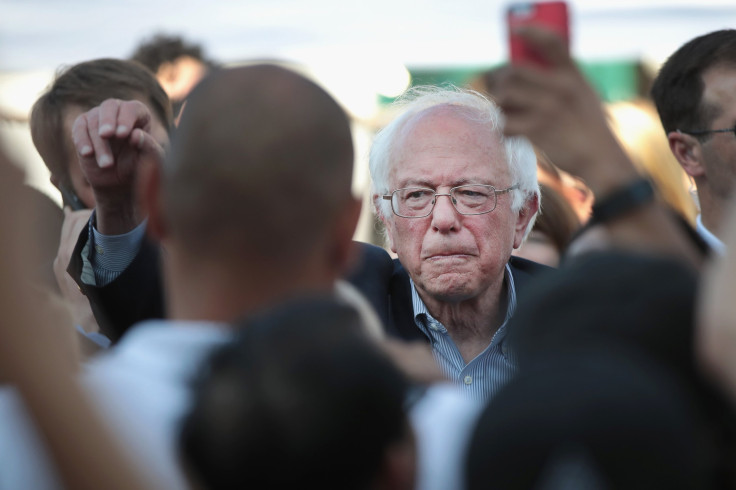Hillary Clinton, Donald Trump Bid For Bernie Sanders Voters Frustrated By Superdelegates System

If you felt the Bern, you're going to be a hot commodity heading into November.
Heat jokes aside, the presumptive party nominees, Republican Donald Trump and Democrat Hillary Clinton, have already begun fighting over supporters of Sen. Bernie Sanders. The Vermont senator shook up the system but ultimately failed to garner enough popular votes, elected delegates or superdelegates to secure the Democratic nomination. More than 10.6 million people voted for Sanders in the primaries, according to the Green Papers, and both candidates need to get those voters on their side for the general election.
This was clear Tuesday night, when both Trump and Clinton made obvious plays to get Sanders' backers on board. Trump, speaking from his golf club in Briarcliff Manor, New York, said he planned to work hard to earn their support.
Donald Trump to Bernie Sanders supporters: "We welcome you with open arms" https://t.co/oZz0jUmo8i #PrimaryDay https://t.co/HeiM2uj1D1
— CNN (@CNN) June 8, 2016
"To all of those Bernie Sanders voters who have been left out in the cold by a rigged system of superdelegates, we welcome you with open arms," Trump said. "The terrible trade deals that Bernie is so vehemently against — and he's right on that — will be taken care of far better than anyone ever thought possible."
About 15 percent of the delegates to the Democratic Convention will be superdelegates who can vote as they wish regardless of primary results, according to NBC. News outlets typically include superdelegates' stances in their delegate counts despite the fact that they don't technically count until the convention and can switch sides. Sanders supporters — and the candidate himself — have expressed frustration that even in states where he performed much better than Clinton, he still didn't leave with a large majority of delegates.
Tuesday wasn't the first time Trump has appealed to Sanders fans, who have already proven their preference for a Washington outsider vowing to fix corrupt politics. In April, he told MSNBC that "Bernie Sanders has a message that's interesting. I'm going to be taking a lot of the things Bernie said and using them."
Sanders' chief rival Clinton took a similar stance in her speech Tuesday. She thanked Sanders — who as of Tuesday night has not dropped out of the race — for running a solid campaign. She then vowed to unite the Democratic Party.
Hillary Clinton commends Bernie Sanders on running an "extraordinary campaign" https://t.co/s8K1ZlRQCxhttps://t.co/LgE31kzgYH
— Bloomberg Politics (@bpolitics) June 8, 2016
"We all need to keep working toward a better, fairer, stronger America. I know it never feels good to put your heart into a cause or a candidate you believe in and to come up short," she said, turning to a common enemy: "The stakes in this election are high and the choice is clear. Donald Trump is temperamentally unfit to be president and commander-in-chief."
Sanders has said he plans to stay in the race until the convention in Philadelphia July 25-28. But the New York Times reported Tuesday his campaign was planning to lay off at least half of its staffers, and Clinton's camp has reportedly been in touch with Sanders'.
Hillary Clinton tells @DavidMuir she looks forward to speaking with Bernie Sanders: “I want to unify the party.”https://t.co/7RrdRFMlMu
— ABC News (@ABC) June 8, 2016
Whether his passionate supporters will jump ship — and if so, to whom — is unclear. An April poll from McClatchy-Marist found 69 percent of Sanders voters said they'd vote for Clinton if she were to be the nominee. Meanwhile, there are nearly 32,000 people who have signed a change.org petition saying the opposite. An ABC poll from May found that 20 percent of Sanders voters said they'd support Trump in November.
Jill Stein, the presidential nominee for the Green Party, has also offered him, and presumably his ardent supporters, a political future. "My offer to collaborate still stands. We are ready to talk anytime," she tweeted Tuesday night. "The revolution must continue."
.@BernieSanders my offer to collaborate still stands. We are ready to talk anytime. The revolution must continue. #PrimaryDay
— Dr. Jill Stein🌻 (@DrJillStein) June 8, 2016
As of Tuesday night, Sanders had 1,599 pledged delegates to Clinton's 1,908. He had 48 superdelegates to her 571.
© Copyright IBTimes 2024. All rights reserved.












